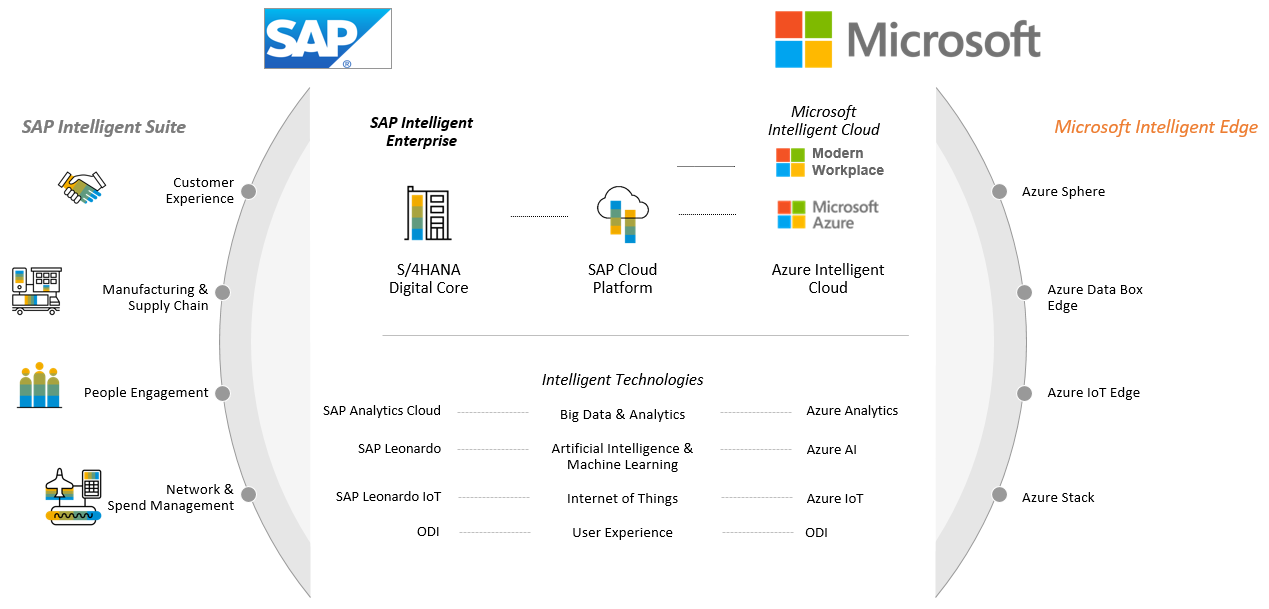SAP on Azure: Knowing and Using the Advantages with Microsoft

(4 min read)
Do you want to meet constantly growing business requirements with targeted data availability and the highest level of information security while keeping your IT costs under control? With your SAP business software in the cloud, you can manage shorter release cycles and growing performance requirements. By adapting new software versions more quickly, you gain access to the targeted networking of your enterprise applications on modern workplaces and with intelligent end devices and sensors for increasingly powerful business processes. Read on for more details about moving your SAP to the cloud.
By moving your SAP environment to the cloud, you gain access to flexible resources, data connections and remote management with defined service levels. A cloud solution provider reliably supplements infrastructure resources to application workloads according to your business needs. On a cloud-computing platform, the execution of SAP applications can be more agile, cost-effective and secure than in an on-premises landscape in your own responsibility. Public cloud providers such as Amazon Web Services (AWS), Google Cloud Platform and Microsoft Azure deliver certified services with defined performance for SAP enterprise applications. If required, additional instances are provided at short notice, compared to days or even weeks with a local infrastructure. In an ideal combination, a Managed Service provider serves you with an optimum of performance, data throughput and system availability for your business-critical processes. With a strategic partner, companies prepare for future technologies in the long term and do not risk unplanned costs or insufficient service capacities for their business.
SAP on Azure: Advantages for SAP Users
In addition to the cost and performance advantages, the functionality factor is decisive for SAP users – and here Microsoft scores particularly well with its Azure cloud platform. This is where the partnership between Microsoft and SAP – and between SAP and NTT DATA Business Solutions existing since the 1990s – pays off. With Azure, companies can make their SAP applications significantly more flexible, scalable and intelligent. The SAP Business Technology Platform, the SAP S/4HANA Cloud enterprise resource planning system, SAP C/4HANA, SAP Success Factors, SAP Fieldglass, SAP Concur and SAP Ariba benefit from reliably available cloud infrastructure. Finally, Identity and Access Management with Azure Active Directory and Microsoft 365 enables secure cloud operation and integration with Office applications simplifies data entry and research for comprehensive business processes.
Using New Technologies
The common SAP technologies are similarly found at Microsoft and can be used in addition according to your application requirements.
- Big Data and Analytics: SAP Analytics Cloud – Azure Analytics
- Artificial Intelligence and Machine Learning: SAP Leonardo – Azure AI
- Internet of Things: SAP Leonardo IoT – Azure IoT

Microsoft solutions are particularly interesting for the special requirements of individual departments, often implemented with lower service costs and paid per use based on consumption. For example, a great advantage companies get that want to process sensor data in SAP but find SAP Leonardo oversized: For them, it is worthwhile to reach the Microsoft “Intelligent Edge” e.g. using Azure Internet of Things (IoT). This service enables companies to create greater clouds, collecting more data for their business operations. By including Azure Artificial Intelligence (AI) and Analytics, enterprises can make better business decisions without high pre-investments. And finally, Microsoft Power Platform allows even more Business Intelligence, customization and automation.
SAP on Azure: How Cost Optimization Works
With the SAP on Azure operating model, there are several options for scaling the infrastructure. Particularly when deploying SAP applications, the Azure Cloud has the advantage of providing the necessary resources in an agile manner. Together with a Managed Services Provider, you coordinate your individual requirements and optimization potential, based on:
- Right-sizing: Virtual Machines (VMs), Network bandwidth and Storage capacity is initially calculated exactly and varied as needed. The basic capacities can be determined for defined areas and time periods (“Infrastructure On Demand”).
- Tight-sizing: Cyclical adjustment of capacities to foreseeable peaks in demand (for example, at the end of a quarter or year).
- Snoozing: Temporarily used systems such as development and test environments can go into stand-by mode and are only booted when required.
- Data Archiving: Less used data is moved from high performance storage to less expensive storage. This requires a precise pre-analysis of up- and download dependencies.
Your Path to SAP on Azure
Our Managed Cloud Services facilitate access to SAP on Azure. To this end, SAP, Microsoft and NTT DATA Business Solutions are working in a strategic partnership to support companies with more flexibility through Azure cloud infrastructures with innovative platform advantages. Our partnership maximizes your benefits through optimal use of SAP Enterprise applications. Together we offer solutions for migration, implementation and monitoring, management and optimization of systems in the hybrid cloud. In addition, NTT DATA Business Solutions also supports the migration of classic SAP products to Microsoft Azure for optimized performance and efficiency.
The approach: Our technology consultants analyze the existing on-premises landscape and work with you to plan the individual path to the appropriate public or mixed hybrid cloud scenario. Your specific requirements and preferences determine the choice of the cloud provider and applications. Experienced technology architects and project managers provide support during the transition. If required, we deliver additional managed services such as monitoring, alerting, backup, security and capacity management if needed 24/7 for your business success.
Learn more about our Managed Cloud Services